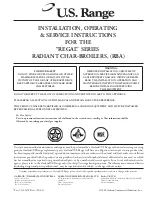
4.1
D.H.W. TEMPERATURE
ADJUSTMENT
The sistem with a potentiometer for adju-
sting the temperature of D.H.W. with a set-
ting range from 30° to 60°C offers a dou-
ble advantage:
1) The boiler adapts perfectly to any type of
D.H.W. system, whether the mixing
system is a mechanical or a thermostat-
controlled type.
2) The thermal output is dosed according
to the temperature required, which
means a considerable saving in fuel.
NOTE: In order to avoid any misunderstan-
ding please remember that the value obtai-
ned by the product of temperature diffe-
rence (in °C) between D.H.W. output and
input into the boiler by the hourly flow rate
measured on the tap, where hot water is
drawn off (l/h), cannot be higher than the
useful output developed by the boiler.
For measurements and checks on flow
rate and temperature of D.H.W., use sui-
table instruments, taking into considera-
tion any heat dispersion along the stretch
of piping between the boiler and the mea-
suring point.
4.2
ADJUSTMENT OF
D.H.W. FLOW RATE
To adjust the D.H.W. flow rate, use the flow
rate adjuster (5 fig. 5).
Remember that the flow rates and corre-
sponding temperatures of use of hot water,
given in section 1.3, have been obtained by
positioning the selector of the circulation
pump on the maximum value.
Should there be any reduction in the
D.H.W. flow rate, the filter installed on the
inlet to the divertor valve (3 fig. 5) will
need cleaning.
4.3
GAS VALVE
The boilers are equipped standard with the
SIT 845 SIMGA/HONEYWELL VK 4105M
/SIEMENS VGU 50 gas valve (fig. 19).
The gas valve is set at two pressure values:
maximum and minimum.
According to the type of gas burnt, these
correspond to the values given in
Table 4
.
The gas pressures at the maximum and
minimum values, are factory set. Conse-
quently they must not be altered.
Only when you switch the appliance from
o n e t y p e o f g a s s u p p l y ( m e t h a n e ) t o
another (butane or propane), it is permit-
ted to alter the operating pressure.
4.4
GAS CONVERSION
This operation must be per formed by
authorised personnel using original Sime
components.
To convert from natural gas
to LPG or vice versa, perform the fol-
lowing operations (fig. 20):
–Close the gas cock.
–Disassemble the burner manifold (3).
–Replace the main nozzles (6) supplied
in a kit, inserting the copper washer
(4). Use a ø 7 spanner to perform
this operation.
–Remove the “METANO/GPL” connec-
tor link on the card and set it in the
position corresponding to the gas to
be used (4 fig. 15).
–To set the values of maximum and
minimum gas pressure, follow the
instructions given in section 4.4.1.
–After have ultimated the conversion of
the boiler, please stick onto the casing
panel the plate showing the relevant
feeding gas which is included into the
kit.
NOTE:
When
reassembling
components
which you have removed, replace gas
seals; test all gas connections after
assembly using soapy water or a pro-
duct made specifically for the purpose,
being sure not to use open flame.
4
USE AND MAINTENANCE
3
4
2
1
5
6
1
2
4
3
5
SIT 845 SIGMA
HONEYWELL VK 4105M
KEY
1
Modulator
2
EV1-EV2 coils
3
Pressure inlet upstream
4
Pressure inlet downstream
5
VENT pressure test point
Fig. 20
KEY
1 Swivel connection 1/2”
2 Locknut 1/2”
3 Burner manifold
4 Washer ø 6.1
5 Burners
6 Nozzle M6
7 Screw
WARNING: To ensure a perfect seal,
always use the washer (4) supplied
in the kit when replacing nozzles,
even in burner units for which it is
not specified.
1
2
3
4
5
SIEMENS VGU 50
TABLE 4
Burner max. pressure
Modulator
Burner min. pressure
Modulator
Type of gas
mbar
current
mbar
current
25
30
mA
25
30
mA
G20 *
11.8
12.0
130
2.0
2.1
0
G30
28.5
28.5
165
4.8
5.0
0
G31
36.5
36.5
165
6.3
6.5
0
(*) Max. burner pressure is guaranteed only when the supply pressure exceeds the max. burner
pressure by at least 3 mbar.
Fig. 19
87
IT
ES
PT
GB
Содержание FORMAT.zip 25 Solar
Страница 1: ...IT ES PT GB CERTIFICAZIONE DEL SISTEMA DI QUALITA AZIENDALE Format zip Solar ...
Страница 2: ......
Страница 95: ......










































